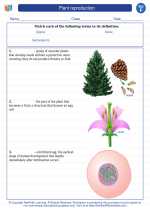Chromosomes
Chromosomes are thread-like structures located in the nucleus of animal and plant cells. They are made up of DNA and proteins, and they carry genetic information in the form of genes. Chromosomes are essential for the transmission of genetic information from one generation to the next.
Structure of Chromosomes
Each chromosome is made up of two sister chromatids, which are joined together at a region called the centromere. The sister chromatids are identical copies of each other, formed during the process of DNA replication. The number of chromosomes in a cell varies among different species. For example, humans have 46 chromosomes (23 pairs) in each cell.
Functions of Chromosomes
Chromosomes play several important roles in the cell, including:
- Carrying genetic information: Genes, which are segments of DNA, are located on chromosomes. These genes determine specific traits and characteristics of an organism.
- Cell division: During cell division, chromosomes ensure that the genetic material is evenly distributed between the daughter cells. This process is crucial for growth, repair, and reproduction.
- Regulation of gene expression: Chromosomes help regulate when and how genes are turned on or off, controlling various cellular processes.
Types of Chromosomes
There are two main types of chromosomes:
- Autosomes: These are chromosomes that contain genes for general body characteristics, not related to sex determination. In humans, there are 22 pairs of autosomes.
- Sex chromosomes: These chromosomes determine an individual's sex. In humans, females have two X chromosomes (XX), while males have one X and one Y chromosome (XY).
Chromosome Abnormalities
Errors or abnormalities in the structure or number of chromosomes can lead to genetic disorders. Some common chromosome abnormalities include Down syndrome (trisomy 21), Turner syndrome (monosomy X), and Klinefelter syndrome (XXY). These conditions can result in physical, developmental, and intellectual disabilities.
Study Guide
Here are some key points to remember about chromosomes:
- Chromosomes are thread-like structures containing DNA and proteins.
- Each chromosome consists of two sister chromatids joined at the centromere.
- Chromosomes carry genetic information in the form of genes.
- They play roles in cell division, gene expression, and determination of an individual's traits.
- There are two main types of chromosomes: autosomes and sex chromosomes.
- Abnormalities in chromosomes can lead to genetic disorders.
Understanding the structure and function of chromosomes is essential for comprehending genetics and heredity, as well as for exploring the causes of genetic disorders.
.◂Science Worksheets and Study Guides Sixth Grade. Plant reproduction
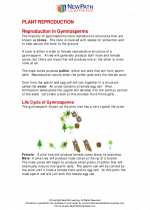
 Activity Lesson
Activity Lesson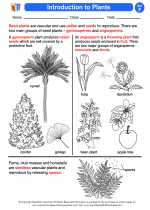
 Worksheet/Answer key
Worksheet/Answer key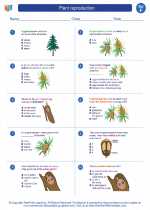
 Worksheet/Answer key
Worksheet/Answer key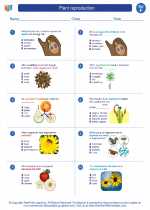
 Worksheet/Answer key
Worksheet/Answer key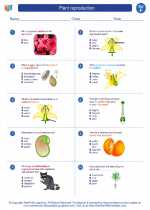
 Vocabulary/Answer key
Vocabulary/Answer key